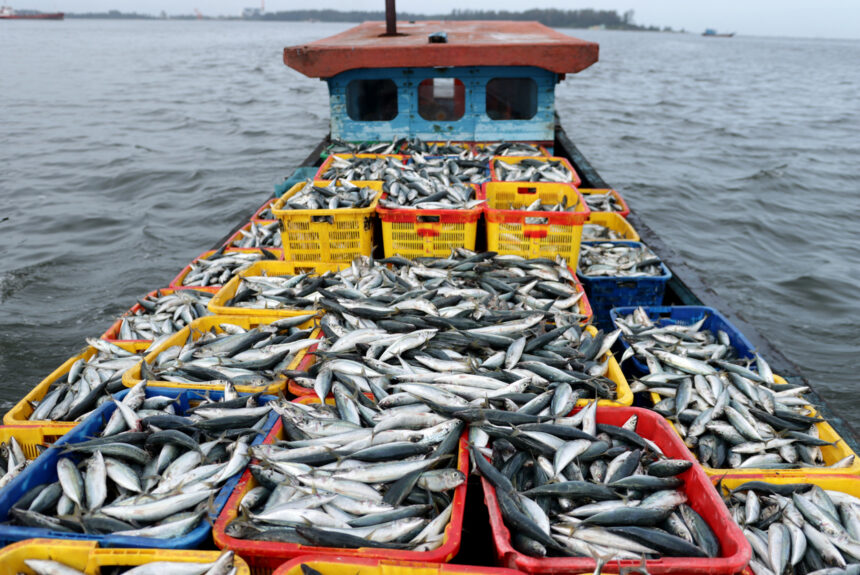The success of the World Trade Organization’s 2022 Agreement on Fisheries Subsidies is crucial not just for fisheries management but for the roadmap it could set for addressing other pressing global commons problems — most obviously climate change.
>>>READ: Achieving Greater Food Security in a Changing Climate
Talks continue on rules to implement the agreement, which still needs dozens more governments to sign on before it can take effect. This month could be pivotal in the fate of the fisheries deal, which is a top agenda item as WTO members convene February 26-29 in Abu Dhabi for their 13th Ministerial Conference. The gathering is a key moment for global trade negotiators to address the pressing issue of harmful subsidies that drive harmful overfishing practices.
Over 90% of the world’s wild stocks are already being fished at maximum capacity or beyond, putting vital global food sources on the brink of permanent collapse. The pollock fishery in the central Bering Sea was once one of the world’s great fisheries but it was overfished until it collapsed. A fishing “moratorium” in that area since the 1990s has failed to bring back pollock stocks.
As with so many ecological problems, government meddling in the marketplace is a central factor. Some 54% of high-seas fishing would not even occur without state subsidies. These harmful subsidies encourage larger, more destructive fishing fleets that deploy industrial bottom trawlers, which scrape the seabed and leave little in their wake.
Commons problems can appear insoluble when every participant pursues their immediate self-interest. The fisheries agreement took more than 20 years to come to fruition, and its future is still not secure. The dilemma faced by WTO members reflects a broader global commons problem. The seas and their resources are shared, and without managed cooperation, overexploitation is inevitable.
The agreement on fisheries subsidies points the way for free-marketeers and environmentalists from across the political spectrum to forge a coalition on similar problems. The IMF estimates that worldwide subsidies for fossil fuels soared from $5 trillion in 2020 to $7 trillion in 2022, or 7.1% of global GDP.
Responding to political pressure from its domestic constituencies, the Biden White House has so far been at best ambivalent toward the WTO, which remains hamstrung by hostile decisions by the previous administration. However, the upcoming meetings in Abu Dhabi will be a test of the WTO’s relevance and effectiveness in addressing complex global challenges. Achieving a meaningful agreement on fisheries subsidies is not just about the fish; it’s about whether WTO members can all agree to stop using their citizens’ tax dollars towards depleting the world’s oceans. Anyone claiming to care about the environment should support rules-based international institutions.
The WTO negotiations toward a more responsible and equitable management of the world’s fisheries could demonstrate that collective action can overcome the tragedy of the commons on a global scale. By integrating environmental considerations into trade agreements, the WTO and its members can promote sustainable practices across various sectors, thereby contributing to the global effort toward sustainability.
>>>READ: Overfishing: The Sustainability Issue You’ve Never Heard Of
Asia-Pacific countries contribute 55% of global capture fisheries production, and fisheries play a critical role in food availability, nutritional security and the economic livelihoods of hundreds of millions of people. But catches are declining. The per-capita catch per fisher has declined from 3.0 metric tons in 1980 to 2.3 metric tons in 2019. The African Development Bank reports that the continent of Africa loses 1 million tonnes of fish per year due to overfishing and bad governance in the fisheries sector. The AFDB quotes world-renowned Rashid Sumaila, Director of the Fisheries Centre at the University of British Columbia in Canada, as saying, “We invest more resources to catch less fish.”
All eyes will be on the Abu Dhabi negotiations and whether WTO members can use their negotiating table to tackle this pressing global commons resource problem.
Christine McDaniel is a Senior Research Fellow at the Mercatus Center at George Mason University. Her research focuses on international trade, globalization, and intellectual property rights. She is the co-director, with Ilia Murtazashvilli, of the Future Fisheries Management workshop, a joint project of Mercatus and the Center for Governance and Markets at the University of Pittsburgh.
The views and opinions expressed are those of the author’s and do not necessarily reflect the official policy or position of C3.

